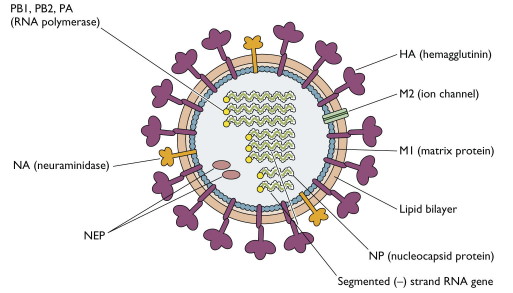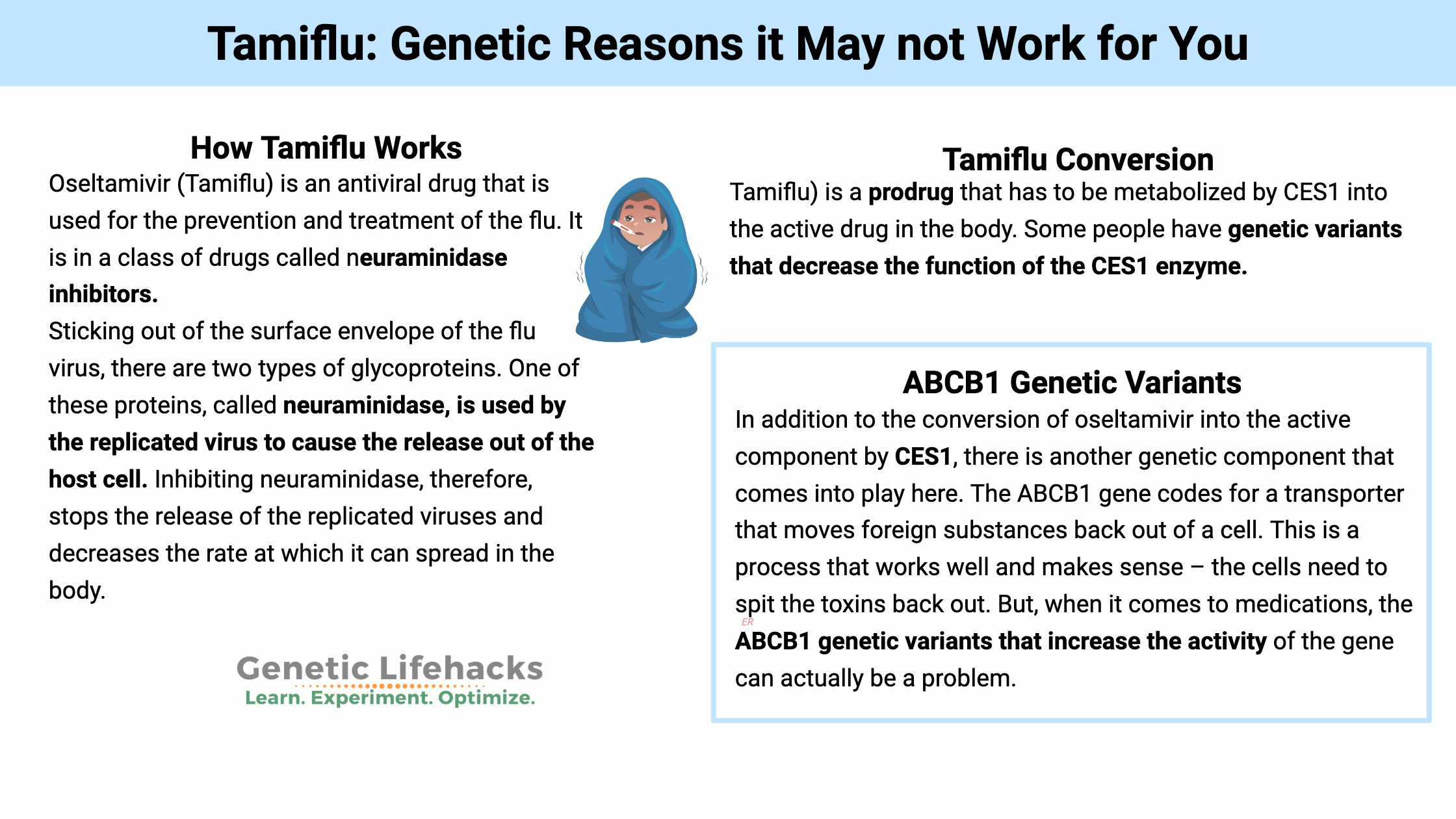Every year about 3 to 5 million people get the flu, and this results in about 250,000 to 500,000 deaths worldwide.[ref] One common prescription medication for the flu is Tamiflu, also known as oseltamivir. There are a couple of genetic variants that influence the way that oseltamivir works.
Fighting flu symptoms with Tamiflu
Influenza is an RNA virus and is divided into the genera: influenza A, B, and C. Influenza A is usually the worst form. Different strains of influenza A and B circulate worldwide each year.
Viruses in general:
Viruses are not classified by biologists as ‘alive’ because they cannot replicate outside of a host cell. First, they must enter a living organism (e.g., humans). Then they move into a cell via a cell membrane receptor. Finally, the virus hijacks the host cell’s ability to transcribe RNA (or DNA) into the proteins needed for the virus to replicate. After the virus replicates, the new viruses are released from the cell, moving on to infect other cells.
Flu virus replication and release:
The influenza viruses are all enveloped viruses. This means that they are surrounded by a lipid envelope. The envelope is actually formed from the host cell’s membrane when the virus is released after replicating in the cell.
Sticking out of the surface envelope of the flu virus, there are two types of glycoproteins. One of these proteins, called neuraminidase, is used by the replicated virus to cause the release out of the host cell. Inhibiting neuraminidase, therefore, stops the release of the replicated viruses and decreases the rate at which it can spread in the body.[ref]

Tamiflu is a neuraminidase inhibitor
Oseltamivir (Tamiflu) is an antiviral drug that is used for the prevention and treatment of the flu. It is in a class of drugs called neuraminidase inhibitors. Other FDA-approved neuraminidase inhibitors include zanamivir (Relenza).
Side effects:
A small minority of people may have significant central nervous system orneuropsychiatric-relatedd side effects from oseltamivir. In Japan, it is now considered ‘counter-indicative’ to give oseltamivir to children aged 10-19 due to concerns that it can cause abnormal behavior or sudden death. Causation has not been proven, though, according to other studies. The abnormal behavior seen in teens included neuropsychiatric adverse reactions such as hallucinations and psychotic symptoms, as well as low body temperature.[ref][ref]
A Cochrane review found that there is a risk for QT prolongation (heart problem), psychiatric disorders, kidney problems, and high blood sugar with oseltamivir. Animal studies back up a lot of these side effects and explain the mechanism of action for everything except for the metabolic effect.[ref]
Conversion into the active drug:
Oseltamivir (Tamiflu) is a prodrug that has to be metabolized by CES1 into the active drug in the body. Some people have genetic variants that decrease the function of the CES1 enzyme.
Women naturally seem to have greater CES1 activity than men, so the effects of the genetic variant may be intensified for men.
Tamiflu Genotype Report:
Not a member? Join here. Membership lets you see your data right in each article and also gives you access to the member’s only information in the Lifehacks sections.
CES1 Genetic Variants:
Check your genetic data for rs71647871 (23andMe v4, v5; AncestryDNA):
- C/C: typical
- C/T: 60% decreased CES1 enzyme function;
- T/T: more than 60% decreased CES1 (rare genotype)[ref]
Members: Your genotype for rs71647871 is —.
Check your genetic data for rs121912777 G428A (23andMe v5; AncestryDNA):
- C/C: typical
- C/T: significantly decreased CES1 enzyme function (rare genotype)[ref]
- T/T: significantly decreased CES1 (rare genotype)
Members: Your genotype for rs121912777 is —.
ABCB1 Genetic Variants:
In addition to the conversion of oseltamivir into the active component by CES1, there is another genetic component that comes into play here. The ABCB1 gene codes for a transporter that moves foreign substances back out of a cell. This is a process that works well and makes sense – the cells need to spit the toxins back out. But, when it comes to medications, the ABCB1 genetic variants that increase the activity of the gene can actually be a problem.
Check your genetic data for rs1045642 C3435T (23andMe v4 only):
- AA: reduced drug efflux (out of the cell), may need lower dosages of some drugs in comparison to those with GG[ref][ref] Increased risk of adverse events with oseltamivir[ref]
- AG: intermediate efflux, no increase in adverse events with oseltamivir
- GG: greater efflux (out of the cell) for drugs and toxins, no increase in adverse events with oseltamivir
Members: Your genotype for rs1045642 is —.
Lifehacks:
Understand the medications available for the flu before you get it… When you have the flu and feel terrible, you aren’t going to be able to think and make rational decisions.
The rest of this article is for Genetic Lifehacks members only. Consider joining today to see the rest of this article.
Related Articles and Topics:
Viral Immunity: Your genes protect you
Your genetic variants shape your immune system and give you superpowers against some pathogens – and perhaps more susceptible to others.
Circadian Rhythm and Immune Response
Your circadian rhythm influences your immune response. Learn how this rhythm controls white blood cell production and why melatonin is important in protecting against viral and bacterial infections.

